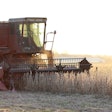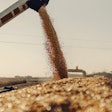
It’s that time of year again and depending on your local crop insurance agent’s vacation schedule and Mother Nature’s temperament, seed is going in the ground.
Spring typically marks the advent of the “Knowing Season”, that time when each consecutive day divulges a little more information about the upcoming crops’ progress, condition and their perceived final outcomes. We like to think that, in our own backyard, we have a firm understanding of this process: we see the planter marks in the fields as we drive to work, we share in the local discussions on weather patterns at the elevator, we know who has and who hasn’t begun to cover inputs with forward contracts.
In many instances, we know whose banker is getting nervous and whose landlords are in for a rude awakening this year. In this aspect we are well versed, indeed, we ARE the experts.
The thing about driveways is that they connect us to something much bigger; maybe to a county road (parish for those in the great state of Louisiana), then to a questionably maintained state highway and perhaps onto the brainchild of Eisenhower himself, the interstate. We are irretrievably and utterly linked with everyone else across this great land.
Reverse this flow and you end up rolling into someone else’s driveway, taking a seat in the office of the guru of another domain and possibly being taken aback that their situation isn’t exactly like yours. A shocking revelation until we realize that our prescription lenses probably won’t work as well for everyone else. It’s this singular vision that, while it serves us well in certain instances, can also be a possible obstacle to seeing the larger picture.
I think that we can safely say that one of the top hurdles to grain merchandising for this upcoming season is getting new crop grain under contract. The current low cash price environment we are experiencing is happening nationwide, and this alone makes us work harder to source the same forward bushels as in previous years. The particularly dangerous twist on this is when the current scenario is paired with tunnel vision.
“But acres were down last year, the report said so!” True, but were they down where it counts, or just around the corner? Was it on the most productive ground in the country, or ground that should’ve never been taken out of pasture?
“Folks won’t plant for the prices being offered; the prices must come up!” Unfortunately, prices don’t see their average rally season until planting is done or nearly so, and most farm plans are set prior to this point. Besides, something has to go in the ground; fallow ground and record rent levels don’t play well together.
“Well if no one around here will plant it, then what will happen? The users will have to pay up!” Yes, and by bidding up the basis when they need it, grain will move from where it is to where it needs to be. Although they may do so for other reasons, many end users will not discontinue their business just because their local farming community cuts back on acres for a year or two.
“We are already out of grain around here! The price can’t stay low all the way to harvest!” As we have already seen this season with the dramatic turn of events with the ethanol industry, anything is possible.
The time of harvesting this upcoming crop is growing closer by the day and being able to see the current environment for what it is should be evident. While it’s easy to jump on the bandwagon of but it has to…, we must keep the focus for our farmer customers where it should always be: determining production costs, estimating yields, setting a profit goal, and taking action by entering targets. The past few years have been a question of losing opportunity, this year could be a question of losing money if we lose our direction in the noise. After all, we would like those same grain trucks in our driveway again next year.
Believe it or not, there are folks who have preempted such a scene from ever transpiring, and in some instances are on track to have just as much grain forward booked for this upcoming harvest as they have each of the past few years. It’s no secret, but it is possessing decision making skills that make this possible, not possessing reams of data.
In the end you must ask yourself this question: Are you offering the action-oriented advice this market demands of you to help your customer, or are you simply repeating the noise that leads to their continued inaction?
Roger Gattis joined the White Commercial Corp. team as a grain merchandising specialist in 2014, after serving the WCC family as the manager/merchandiser of participant elevators in the Sourth and Midwest since 2003. He can be reached at 816-666-8708 or[email protected]and on Twitter@weevilhog.


















